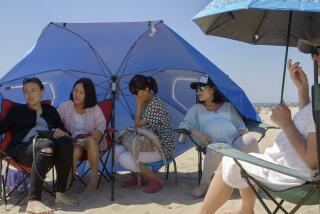Baby Online
- Share via
COSTA MESA — In what is believed to be the first case of online motherhood, a Riverside County couple plans to broadcast the birth of their child on the Internet this month.
Brad and Karen Park of Wildomar will use a digital camera and computer laptop to film and send live footage of the birth of their second child to a private site on the World Wide Web.
The goal, says Brad, is to allow family and friends who are unable to attend the event to watch.
A small camera, connected to a laptop computer, will be placed in a corner of the delivery room at Sharp HealthCare Murietta. Relatives will be given the address to a secure Web site, a user name and a password to access the site. The broadcast--one frame snapped every six seconds--will only show Karen from the waist up.
“It’s a really interesting twist on the privacy issue,” said Celia Pearce, author of “The Interactive Book: A Guide to the Interactive Revolution.”
“The normal concern is that others are using technology to invade our personal space. But this is a case of family values merging with digital exhibitionism.”
Karen was only 22 when she gave birth to her first child, Courtney. A single parent at the time, Karen remembers that her parents and siblings joined her in the delivery room, holding her hand and trying to help.
This time, only Brad will be donning surgical scrubs. While some of Karen’s relatives plan to wait in the lobby, the rest will be watching at home on their PCs.
The idea to film the birth of the baby, which is due Feb. 15, came from Eric Harvey, the Parks’ close friend and the owner of a Costa Mesa start-up firm that installs digital cameras in people’s homes. Harvey’s company, Kidcams, uses digital cameras to help parents keep an eye on their in-home, day-care givers.
“It was the gimmick of being able to do it that got me,” said Brad, 35. “It’s not ‘new,’ it’s not gross, it’s a beautiful personal event. I could go in there with a video camera, but this seems to be a less intrusive way of capturing the event.”
Karen’s doctors and the hospital staff say they have no complaints as long as the camera remains out of the way.
“Philosophically, we support anything that makes the patient more comfortable,” said hospital spokesman Steven Art. “It’s a little odd, though, that’s for sure.”
The American College of Obstetricians and Gynecologists has nothing in its code of ethics pertinent to the issue of taping deliveries for viewing by friends and family, said Greg Phillips, a spokesman for the group.
“If the parents have agreed to it, and the doctor isn’t held liable, I can’t imagine a problem” if all goes well, he said.
“But if something goes wrong during the delivery, that could present problems,” Phillips said. “Do they want the family to see this woman in distress?”
The online birth is the latest example of how computers can let friends and strangers into a person’s private life, say sociologists. In the digital age, they note, computer technology is continually expanding the boundaries of what is acceptable for others to see and what is not.
Thanks to the rapid adoption of digital technology in the home, the Internet has become a vehicle for self-disclosure. Some people use it to talk about their sexuality and emotional fears, while others build elaborate Web sites devoted to their favorite tastes and quirks.
In fact, broadcasting systems on the World Wide Web, like the one the Parks will use, emerged around 1993, when users hooked portable digital cameras to their computers and displayed live pictures of their work and home environments. Today, scientists say thousands of people use these camera-and-computer setups.
“When the virtual experience is more intimate than the one shared by those sitting in the next room, the implications are far-reaching,” said James Katz, a professor of communication who studies technology issues at Rutgers University.
Times staff writer E. Scott Reckard contributed to this story.
More to Read
Sign up for Essential California
The most important California stories and recommendations in your inbox every morning.
You may occasionally receive promotional content from the Los Angeles Times.













